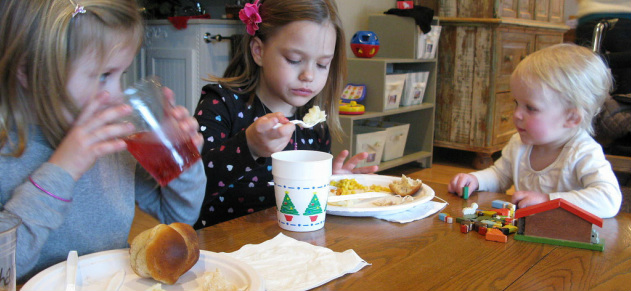Discuss how when we say things in anger, we can hurt others by our unkind and thoughtless words. This is why the Bible says, “The tongue is a small thing that makes grand speeches. But a tiny spark can set a great forest on fire” (James 3:5 NLT). Talk about how even small words can set off big emotions, how an unkind word can cause someone to cry, and how a kind and gentle word can make someone’s day. Watch “Stay Sweet.” This video features ideas of what to do when faced with a situation where it could be easy to lose one’s temper. Memorize the verse “A gentle answer turns away wrath” (Proverbs 15:1 NIV). You can help your children write this verse in their notebooks or somewhere easily visible throughout the day. Read “Love Focuses on the Good.” Do the action on the last page of this article. Watch “I Get Along with My Brother.” Brainstorm ways to resolve common conflicts that arise with your child. It may be good to discuss how when you are feeling angry or upset, that probably isn’t the best time to try to talk to the friend or peer causing the upset. Waiting till one is calmer, or talking about one’s feelings with a parent or teacher can also help to set things right. Read “How Do We Love Others?” Do the action on the last page of this article. Additional Material:
Adapted from My Wonder Studio
0 Comments
A compilation for parents and caregivers The time that you spend with your children is prime time. You’re on stage, so to speak, influencing and teaching them by your words and behavior—whether you want to or not. So, in parent-child relationships, just spending time together is not enough. To make that time meaningful, it needs to be quality time. Careful thought and planning is a prerequisite for successful parenting. … Quality time together is one of the most important factors in building healthy and wholesome parent-child relationships. Quality time together may be a noisy family celebration, a quiet evening at home listening to [your] daughter practice her music, a sleepless night nursing a fevered child, a holiday spent cleaning out the garage together, or an hour spent in animated discussion. Whatever the activity, quality time together should convey such important messages as: “I love you,” “I want to be close to you,” “I enjoy you,” “You’re fun to be with.” … Every family benefits by setting aside a regularly scheduled family time. … When you begin to schedule quality time together, it is important that you and your child do things that have meaning. List your family’s favorite activities. Brainstorm them. Then rank these items from the most important to the least important. Finally, schedule the activities that you consider high priority. If you schedule only the easiest activities, or those that take the least effort or time, you might miss the most important ones.--Dr. Kay Kuzma * We can get so caught up in our state of endless busyness and frantic schedules and time-paced lives that we forget that what really counts most with our kids are those simple little things we do that make their homes fun, comfortable, and happy places. The following questions will help you reflect on how well you’re meeting that objective. 1. What would your child say is the best part of living in your home? What are the best traditions you do together that are so fun she’ll want to carry them on with her own child? The bottom line: What kind of memories are you creating for your children in your day-to-day existence? 2. What do you think your own kids would say is the one thing they wish they could change about your family? Could you make that change? What’s stopping you? 3. When is the last time your family sat and just giggled and laughed? When is the last time you remember your family doing absolutely nothing [together]? 4. What is one simple tradition or family routine you want to do to have fun with your family? Write it down. Then get ready to use it with your family. Suppose your children were asked what one thing they really wish they could change about your family. That very question was asked of eighty-four thousand students in grades six through twelve who completed a USA Weekend survey. What do you think most of the kids said? (Chances are it’s the same thing your own kids would say, so think hard.) It turns out that almost two-thirds of kids surveyed said they wished they could spend more time with their parents. In fact, more than two in five kids feel that time with their moms is rushed. What the kids said they wanted was not just more time, but more relaxed time. The kind of time a kid would consider as just plain “fun.” No expectations. No stress. No frantic pace. Just relaxed, good ol’ fun. It’s the kind of time that creates family togetherness. That relaxed, carefree time is also what our kids crave and need.--Michele Borba * One day before long, your children will be grown and gone. You’ll be thankful then that you gave them what they needed when they were growing up. … So during those hours in the night while you are keeping watch over a sick child, smiling when you want to cry, singing as you pray for patience, wiping little noses while you dream of someday doing great things for God, just remember that you are. You will never regret one prayer, one song, one loving word. Each small act of love reaches out to [your children] and touches them for eternity. After all the years of taking it all by faith, someday you—like me—will be blessed at seeing what they have become.--Derek and Michelle Brooks * As the saying goes: “What I do today is very important because I’m exchanging a day of my life for it. When tomorrow comes, this day will be gone, forever, leaving something in its place I have traded for it. I want it to be gain, not loss; good, not evil; success, not failure; in order that I shall not regret the price I paid for it.” That’s doubly true for you who are caring for your children. It’s not only an hour, or a few hours, or a day of your life, it’s an hour or two or a day of their lives as well. What are you filling their minds, hearts, and lives with? It’s not only about ensuring that they are learning their academic lessons. It’s about the love you show them, the example you impart, your manner with them, your attitude, your smile, and much more. What will your children take away from this day? Will it add to the foundation of their life? Will you know in your heart that you traded that day of your life well, because of what it resulted in or added to the lives of your children? You may not always see that your efforts are making a difference. Some days you will, but other days are tough. In those times, look at your little ones. You are investing the days of your life in them. You are trading your time, your life, your love, your skills, for lasting dividends in their lives.--Jesus, speaking in prophecy Courtesy of Anchor. Photo by Bill Branson [Public domain], via Wikimedia Commons
By Barbara Moran, Web reprint Our small moments can be our children's biggest moments. As parents, we may feel pressure to compete with the high-tech variety of activities, computers and videos for our children's brain space. It's easy to discount the gift of our time, no matter how brief or uncomplicated. Think back to childhood. The first time I saw a gold finch bird, I was about three. In the woods near our town's old boathouse, my mom suddenly whispered, "Look!-In that tree. See the yellow bird?" That small moment for her was one of my childhood's biggest moments. Though she had seen many gold finches, I had never seen a wild yellow bird before. The world was a beautiful, amazing place. That moment evolved into a memory. The gold finch remains my favorite bird. I told the story to my son, who now takes charge of keeping our feeder filled with sunflower seeds. We await "our" migrating gold finches (and later, their young) each spring. Think back to those who shared "small moments" with you. Chances are if you mentioned it to them, their memories would go blank. But you remember how they shared moments of knowledge or kindness, and in so doing, shared a part of themselves with you. Let us never underestimate how the genuine gift of our time, no matter how much or little, is part of our legacy to our children. It is how we make deposits into their memory banks. I don't remember if that walk with my mom took an hour or five minutes. I just remember her excitement. And her smile. And that's enough for me. Photo courtesy of Wikipedia. Used under CC-SA license.
The art of praise—what is known as positive reinforcement in the current psychological jargon—is an essential art for a parent or teacher to master... The teenagers who sit in my office tell me again and again, “My dad gets all over my case when I mess up at school, but when I bring home a good grade he acts as if it’s nothing—that I’m finally doing what I should have been doing all along.” Stop and think. How long has it been since you took a full 60 seconds to talk to your son or daughter about some fine thing they’ve just done? —Alan Loy McGinnis
*** A nurse ushered me into my grandma’s room. Lying in the hospital bed, she looked so small. Her eyes were closed. I sat down quietly. I was on my way to seminary and full of self-doubt. I had just given up a full scholarship to medical school, and everyone thought I was making a mistake. I desperately wanted Grandma’s advice, but the nurse had warned me that she didn’t have much strength left. After half an hour, Grandma hadn’t stirred, so I just started talking. Suddenly she woke up, asking, “Danny, is that you?” She told me how her faith had guided her all her life. After a few minutes, a great peace settled around us. I kissed Grandma and turned to leave, but then I heard her whisper some parting words. I leaned over to listen. “I believe in you,” she said. Grandma died that night, but in more than 20 years of work as a Christian psychologist, I have passed on her words many times. Four simple words can make a lifetime of difference. --Dan Montgomery *** The week before my father died, when I was a senior in college, he took me aside and showed me a box of clippings of newspaper and magazine articles he had written and hidden away. When I asked in surprise why he hadn’t shown me these before, he replied, “Your mother discouraged me from writing because I don’t have a college education, so I’ve done it in secret and she doesn’t know.” Mother had not meant to be a discourager, but she had stated what seemed an obvious fact to her: If you’re not educated, you shouldn’t write. My father had not let this attitude depress him, but he had “hidden his light under a bushel.” He told me he had written an article for the Advance magazine but it had not been published. “I guess I reached for something a little too big this time,” he shared. How touched I was that he had told me about his interest in writing and the article he had submitted to the Advance magazine! Within days my father dropped dead in a Boston subway station, and on the day of the funeral the new issue of Advance arrived—with his article published in it. Had he not confided in me, I would never have opened that issue. I have the framed article with my father’s picture hanging in my study, and each time I glance at it I wonder what that man might have become as a writer if only someone had believed in him. We live in a discouraging world full of people who put us down. What bright lights we can be when we say the simple words, “I have confidence in you!” —Florence Littauer Web Reprint, adapted Raising a happy, healthy child is one of the most challenging jobs a parent can have—and one of the most rewarding. Fortunately, parenting is one of the most researched areas in the field of social science. No matter what our parenting style or what our parenting questions or concerns may be, from helping our children avoid becoming part of the child obesity epidemic to dealing with behavior problems, experts can help. One challenge most parents face at one time or another is the dinnertime battle. Here are a few thoughts from well-known nutrition experts on how to get kids to go from being picky eaters to people with sound, varied diets. • Avoid a mealtime power struggle. One of the surest ways to win the battle but lose the war is to engage in a power struggle with your child over food, says Jody Johnston Pawel, LSW, CFLE, author of The Parent’s Toolshop. With power struggles, you’re saying, “Do it because I’m the parent,” and that’s a rationale that won’t work for long, she says. But if your child understands the why behind the rules, those values can lay the groundwork for a lifetime of sound food choices. • Let kids participate. Get a stepstool and ask your kids to lend a hand with easy tasks in the kitchen, says Sal Severe, PhD, author of How to Behave So Your Children Will, Too. “If they participate in helping to make the meal, they are more likely to want to try it,” he says. Older children and teens can begin to prepare special meals or dishes by themselves. Get teens started learning to prepare healthy foods before it’s time to live on their own. • Don’t label. More often than not, kids under 5 are selective eaters. “Being selective is actually normal,” says Elizabeth Ward, MS, RD. She prefers the term “limited eater” to the more negative term “picky.” • Build on the positives. Just as children can get comfort from reading the same story over and over, they enjoy having a set of “predictable” foods. “Even though they aren’t getting a wide variety of foods, they are actually doing OK nutritionally,” says Ward. When the child goes through a growth spurt and has a bigger appetite, use that opportunity to introduce new foods, she recommends. • Expose, expose, expose. Ward says a child needs to be exposed to a new food 10 to 15 times before he or she will accept it. But many parents give up long before that. So, even if your child only plays with the strawberry on her plate, don’t give up. One day, she just may surprise you by taking a bite. But don’t go overboard, says Severe. Limit exposure to one or two new foods a week. • Don’t bribe. Avoid using sweets as a bribe to get kids to eat something else, says Pawel. That can send the message that doing the right thing should involve an external reward as well as reinforces the pattern that eating unhealthy foods is a good way to reward yourself. The real reward of sound nutrition is a healthy body, not a chocolate cupcake. • Beware of over-snacking. Sometimes the problem isn’t that the child doesn’t like new foods but that they are already full, says Ward. “Kids can consume a lot of their calories as milk and juice.” Encourage the kids to drink water rather than juice when they’re thirsty. The same goes for snacks that provide little more than calories, such as chips, sweets, and sodas. “If you are going to offer snacks, make sure they are supplementing meals, not sabotaging them,” she says. • Establish limits. Having a set of bottom-line limits can help a parent provide some consistency, says Pawel. For example, parents may require that kids eat nutritious foods before snack food. Or that they must at least try a new food before rejecting it. “Consistency only works if what you are doing in the first place is reasonable,” she says. So, avoid overly controlling or overly permissive eating rules. If bottomline limits are healthy, effective, and balanced, they’ll pay off. • Examine your role model. Make sure you aren’t asking kids to “do as I say, not as I do,” says Pawel. If your own diet is based mainly on fat, sugar, and salt, you can hardly expect your child to embrace a dinner salad over French fries. • Defuse mealtimes. Don’t make your child’s eating habits part of the mealtime discussion, says Ward. Otherwise every meal becomes a stressful event, centered on what the child does and does not eat. Ward suggests that parents reserve talks about the importance of good eating for later, perhaps at bedtime or story time. • Give it time. “I find that children become much more open to trying new foods after the age of 5,” says Ward. “Most of the time, kids will simply grow out of limited eating.” Courtesy of Motivated magazine. Used with permission. Photo by Oakley Originals via Flickr.
From the bogeyman for small children to the bogies of SATs and final exams for the college-bound, stress affects kids of all ages. The first thing a parent can do to help their child manage stress is to build a strong family unit. Include your children in family discussions and be on the lookout for stress in your kids. Recognizing Stress in Children Especially small children with under-developed communication skills may display stress very differently than an adult does. Often kids’ stress is internalized and most noticeable in physical symptoms such as frequent flu-like symptoms including headache, stomachache, and even nausea. Children under stress may regress to behaviors like bedwetting, clinginess, and frequent crying. Behavioral symptoms may be extreme at both ends of a behavior spectrum. A normally active child becomes either listless or hyperactive, a usually docile child has fits of anger or a child that “acts out” becomes docile and introspective. Some signs of stress in kids are easily confused with children’s mental disorders. For instance, if schoolwork slides or your child’s circle of friends undergoes a drastic change, it isn’t a sure sign that your child is on drugs. Situations like these may simply indicate a child’s inability to handle a stressful situation. Helping Kids Reduce Stress Children primarily learn by example. The best way to teach your child how to manage stress is by using the tools and articles at Stress Management Tips to learn to effectively manage your stressors. In addition, you can develop skills and child-oriented stress management techniques to help your kids recognize and manage their stressors.
Text courtesy of Motivated magazine. Photo by Lotus Carroll via Flickr.
|
Categories
All
Archives
March 2024
LinksFree Children's Stories |







 RSS Feed
RSS Feed
